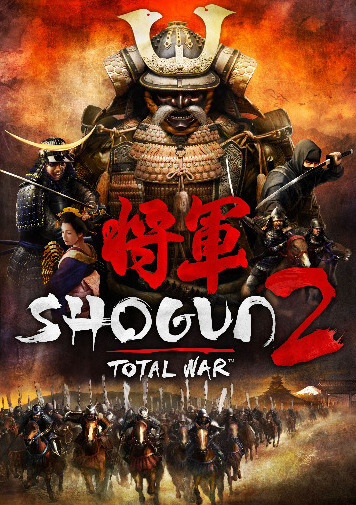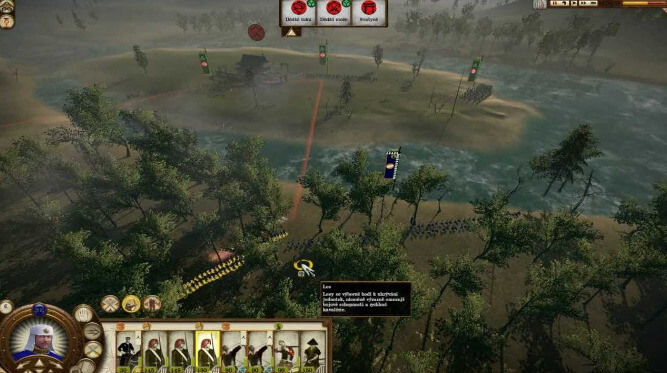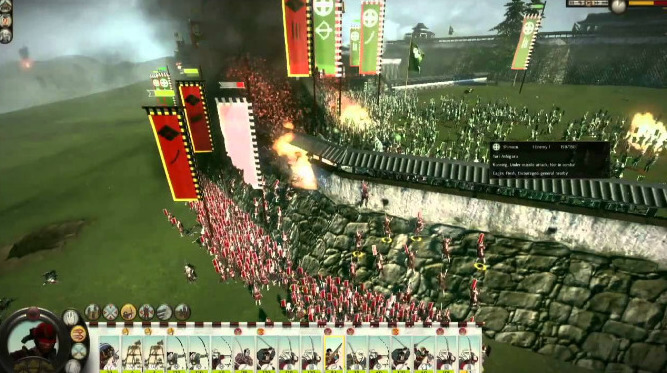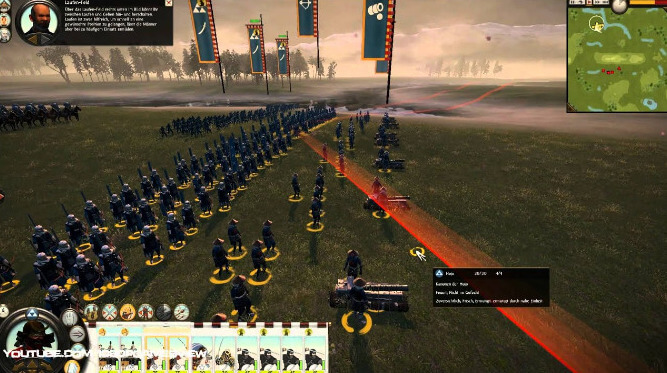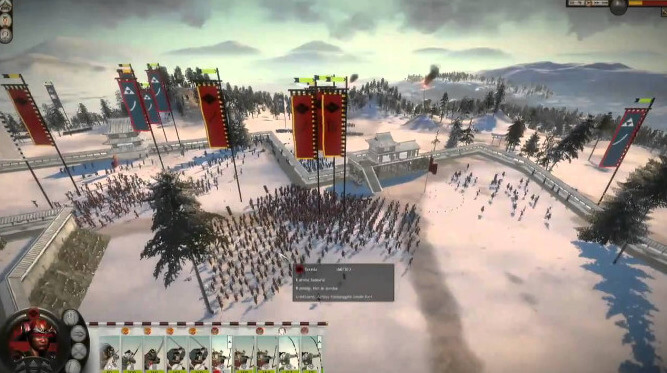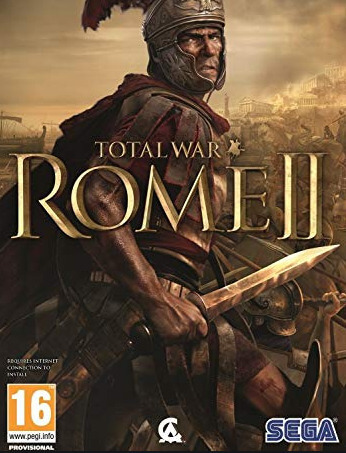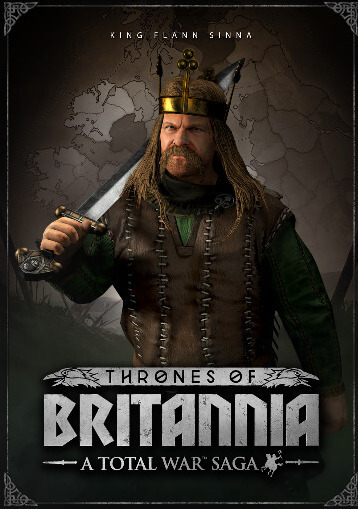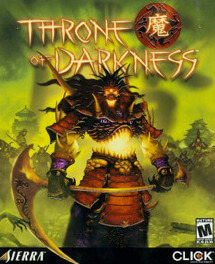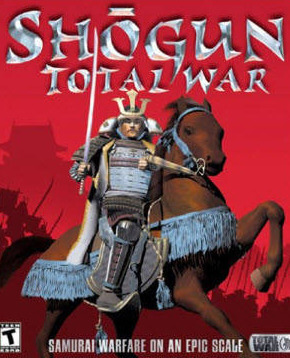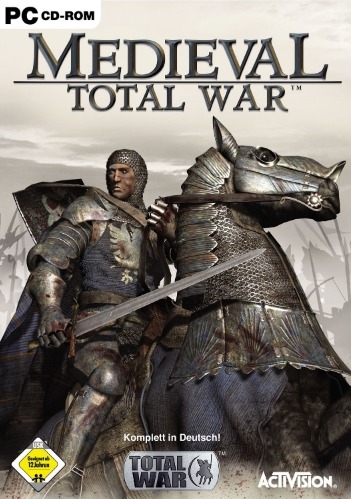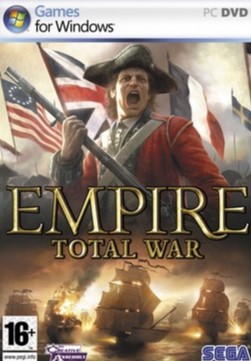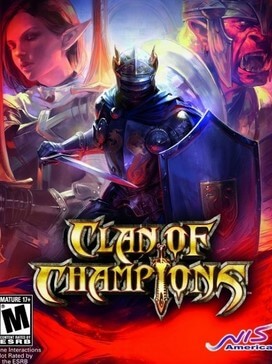In the campaign, the player needs to oversee the development of settlements, military production, economic growth, and technological advancement respectively. The armies and units are organised and moved around the stylised campaign map by the player to carry out battles with other factions. In addition to fighting, the player is able to engage in diplomacy, political manoeuvring and the use of special agents to gain the upper hand. Ninja and geisha are also present in the game as assassins and spies. While religion isn't as relevant as it was in Medieval II: Total War, it can't be neglected by the player. Greater interaction with the European foreigners (Nanban traders), for example, to enhance trade and acquire firearms, exposes the clan to Christianity, which will seriously increase religious unrest in the provinces. Religious agents, such as monks and priests can be used to convert the enemy population.
There are nine major clans that inhabit the provinces of Japan which the player chooses from. There are others, including the "Akamasu retainer clan". All Clans have particular advantages in certain areas, to give a variety of play style with each.
The Chōsokabe clan inhabit Tosa Province and can recruit superior bowmen and generate more income from farming.
The Date clan control Iwate and can recruit superior no-dachi samurai, their units also get a bonus when charging.
The Hōjō clan are great castle builders and siege specialists. They inhabit Izu and Sagami.
The Mōri clan inhabit Aki and have a long history of naval mastery.
The Oda clan are efficient commanders of ashigaru and are settled in Owari.
The Shimazu clan inhabit Satsuma and can recruit superior katana-armed samurai, their generals are also more loyal to their clan.
The Takeda clan warlords preside over Kai and recruit superior cavalry.
The Tokugawa clan inhabit Mikawa province initially as a vassal of the Imagawa clan and rely on diplomatic relations and the recruitment of better warrior ninja and metsuke.
The Uesugi clan control Echigo and specialise in Buddhism, allowing them to recruit better monks and warrior monks as well as generating more income from trading.
There are also three factions available as downloadable content (the Hattori faction came complimentary with preorders of the game, however):
The Hattori are the leading family in Iga and recruit specialised ninja and warrior ninja with more expertise.
The Ikkō-ikki clan are a "family" of religious rebels that control Echizen and Kaga and recruit rōnin and superior warrior monks.
The Ōtomo clan control Bungo Province and Buzen Province, they start under the Catholic faith and can recruit superior firearm units, as well as Portuguese Elite Infantry known as terços.
In Total War: Shogun 2, leaders and generals are given personality and depth in gameplay, with high emphasis on role-playing. Generals and agents are portrayed as "larger-than-life" heroes with unique characteristics and powerful abilities. The player is able to improve and unlock traits and special abilities for the characters as they gain experience. However, the player may also be inclined to engage in family politics within the clan to keep its members loyal.
The battles of Shogun 2 involve large-scale engagements between armies that meet on the campaign map and can take place on land or on water. The developers proclaim they are paying particular attention to re-designing the naval and siege battles appropriate to the new setting. In contrast to European castles and forts, the castles in feudal Japan had multiple tiers, and thus the siege battles in the game will put less focus on wall defences but more on courtyard brawls and tactical manoeuvring. Also, the players will fight naval battles with unique Japanese ships resembling "floating castles", and take into consideration melees on ships, arrow fire, coastal terrain, and other factors.
Like the recent installments, Empire and Napoleon: Total War, the weather and climatic conditions have an effect on battles. For example, fog greatly reduces visibility, while heavy rain diminishes the effectiveness of missile troops, such as archers or gunners, thus requiring the players to adapt their strategies. Also, as in Napoleon, armies standing on enemy provinces during winter season or fleets far from the coast suffer attrition.
Shogun 2 is known for a unique event for the series known as Realm Divide, in which one by one, all computer-controlled surviving clans declare war on the player (or players in coop-campaign mode) and ally with each other, though the player's allies tend to do so later. Realm Divide is triggered when the player captures enough territories or captures Kyoto. The clan's fame shows how close the player is to triggering realm divide.
